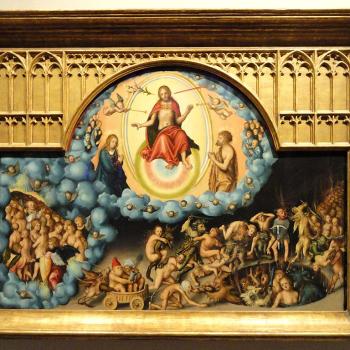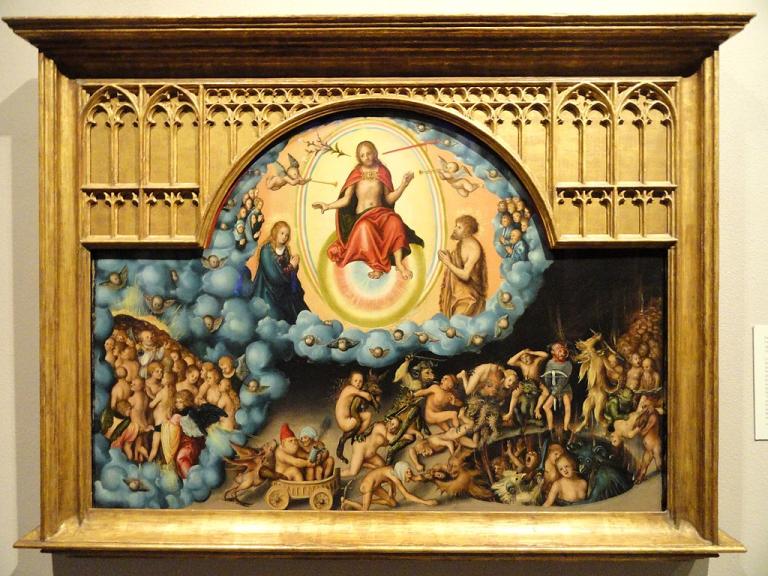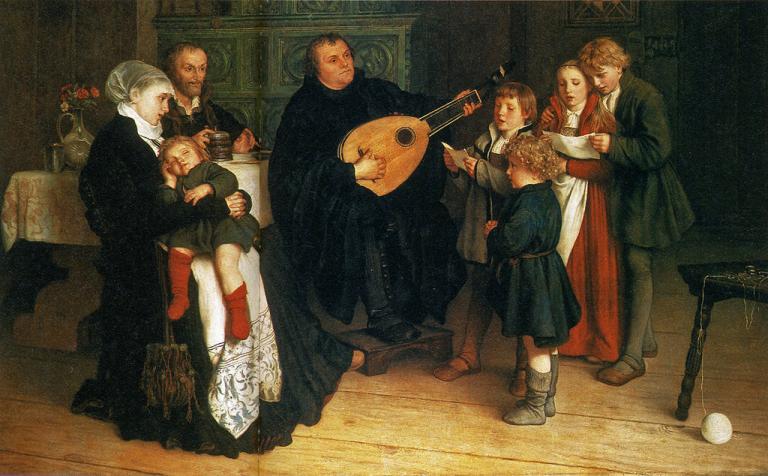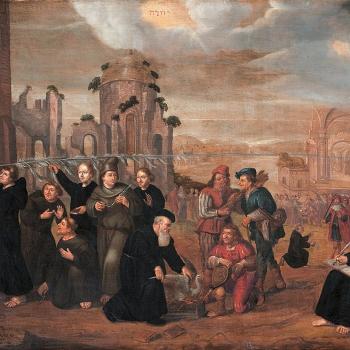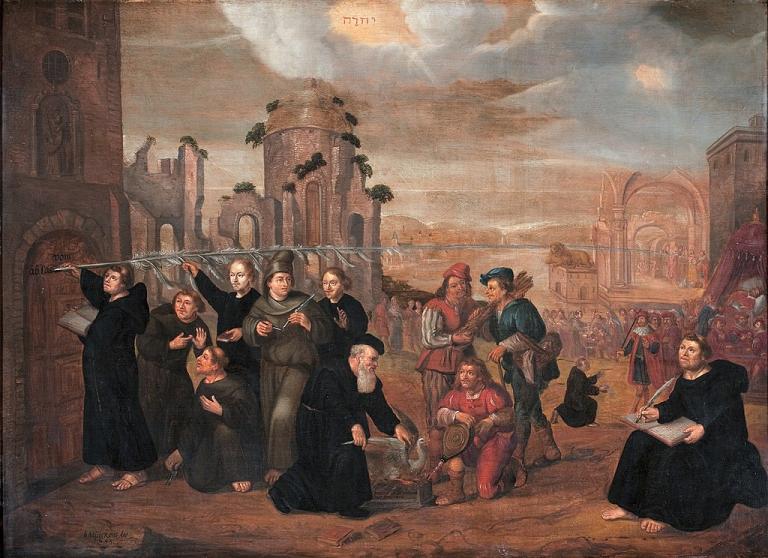Among the signs of the End Times are false prophets, false Christs, and miracle workers. So in accord with the Advent theme of “watching,” this would be a good occasion to make ourselves aware of the latest heresy afflicting contemporary Christianity.
We Lutherans tend to be insulated from what is going on in other churches, but I suspect some of you from other traditions have encountered the New Apostolic Reformation.
Douglas Geivett and Holly Pivec have recently published a book entitled Counterfeit Kingdom: The Dangers of New Revelation, New Prophets, and New Age Practices in the Church. They have also written a guest post at the Patheos blog Theological Apologetics entitled The New Apostolic Reformation, A Threat Within The Church?
Here is how the post begins:
A dangerous set of teachings is shaping America’s worship songs, ministries, and political engagement. This new movement is influencing many churches and individual Christians, often without their realization.
The New Apostolic Reformation movement (NAR) is a popular, fast-growing movement of Christians who claim God is giving new revelation through new apostles and prophets. They say they are giving strategies the church requires for all Christians to learn to work miracles—such as prophesying, healing the sick, and raising the dead—and “bring heaven to earth.” This movement is called the New Apostolic Reformation because its leaders teach that a new reformation—much like the Protestant Reformation but even more significant—is underway. This reformation is bringing authoritative, governing apostles back to the church. All other church leaders, including pastors and elders, must “align” with them (a euphemism meaning they must submit to them). Those who follow the apostles will play a pivotal role in the unfolding of God’s end-time plans for the world. Those who don’t will sit on the sidelines as mere spectators.
The NAR emphasizes “signs and wonders,” including healing the sick, personal revelations, and other miracles. In this they are like other Pentecostals. But they take this to extremes, teaching that God always wants every sick person to be healed. They also incorporate what Geivett and Pivac call “New Age” practices, “examples being ‘prophetic activation exercises’ and the use of Christianized versions of tarot cards. NAR leaders claim New Agers have stolen practices from Christians and now they must be redeemed and reclaimed by Christians because they are important tools for advancing God’s kingdom.”
NAR is fixated on the End Times, but unlike most evangelicals with this interest, they seem to be post-Millennial. That is, they believe that Christians “bring on” the Second Coming of Christ by establishing a Christian kingdom on earth. This brings us to their “dominionism.” They believe that Christians should establish a theocratic rule over the whole earth. They will do so by fulfilling the Seven Mountain Mandate, establishing Christian dominance of the seven “mountains” of society: family, religion, education, media, entertainment, business, and government. Again, Christians have long wanted to extend a Christian influence in these areas, as in all of life, but, again, NAR takes this to an extreme.
This is manifested, for example, in NAR political activism. Many of the most zealous “evangelical” supporters of Donald Trump, for example, are followers of the New Apostolic Reformation. They supported him not so much because he would appoint pro-life judges or the like, as other evangelicals did, but because they are convinced he fulfills Biblical prophecy and will help Christians attain political power.
NAR is selling its own translation of the Bible, the “Passion Translation,” which renders the Bible so that it supports NAR teachings and which, according to Geivett and Pivac, was “produced by a NAR apostle without expertise in the original languages who publicly claims that ‘secrets of the Hebrew language’ were ‘downloaded’ and ‘breathed’ into him by Jesus directly.”
This, in turn, brings us to the definitive teaching of the New Apostolic Reformation: the authority of God-inspired “apostles” and “prophets.” Geivett and Pivac say this about them:
The core NAR teaching—which separates NAR from all others—is that present-day apostles and prophets must govern the church. And influential NAR leaders have made it clear that—when it comes to church governance—apostles are first in God’s “order of priority.”. . .
NAR apostles and prophets also claim to receive face-to-face visits from Jesus and angels, to make trips to the courtroom of heaven, and to receive revelations for the global church.
The Wikipedia article on the movement says that it “seeks to establish a fifth branch within Christendom distinct from Catholicism, Protestantism, Oriental Orthodoxy, and Eastern Orthodoxy.” But since the movement conceives of itself as a “Reformation,” on a par with that of Luther, the NAR seeks to spread its influence beyond a few Pentecostal megachurches into all of Christianity.
In their book, Geivett and Pivac trace this influence, showing how, for example, much contemporary Christian music, including many popular praise songs used in contemporary worship–such as that of Hillsong–originated in the NAR movement.
The NAR emphasis on the Holy Spirit’s revelation through human leaders reminds me of a statement attributed to Luther. (If any of you know the source, please mention it in the comments.) He said that the “enthusiasts”–that is, those who look to a “God within” and expect direct revelations apart from God’s Word–are essentially the same as his other antagonist, the “papists,” who believe the Holy Spirit speaks through the Pope. Enthusiasts are actually worse because they have lots of popes, whereas Rome only has one.
As we contemplate the End Times for Advent, we must recall Christ’s own words when His disciples asked him about signs of the End. Among other things, He said, “false christs and false prophets will arise and perform great signs and wonders, so as to lead astray, if possible, even the elect” (Matthew 24:24).
Notice that while “signs and wonders” were prominent in the days of the Old and New Testaments, in the last days, they will come from the other side! I am not aware of any spectacular miracles performed by the NAR folks, though they must claim some. To be sure, God can still heal people and perform other miracles, but emphasizing them and using them as evidence of spiritual validity–whether defending Catholicism by the miracles of the saints or NAR prophets claiming supernatural powers–should make us suspicious.
Christians are indeed inspired and empowered by the Holy Spirit. This happens when we read the Bible and hear the preaching of God’s Word. The Church is certainly apostolic, because it is grounded in the teachings of the Apostles who wrote the Bible. And the Gospel is about what God’s grace and the work of Christ do for us, not what do or our achievement of an earthly dominion. We do indeed take our faith into every area of society. This is called vocation. We do not put our hope in attaining earthly power and glory–God’s “is the kingdom, the power, and the glory forever.” We put our hope in the cross of Jesus Christ and understand that we too must bear our crosses.
Scripture, Christ, Grace, Faith–that’s all we need. That’s the message of the Old Apostolic Reformation. And they are still all we need.
Illustration from Amazon.com






